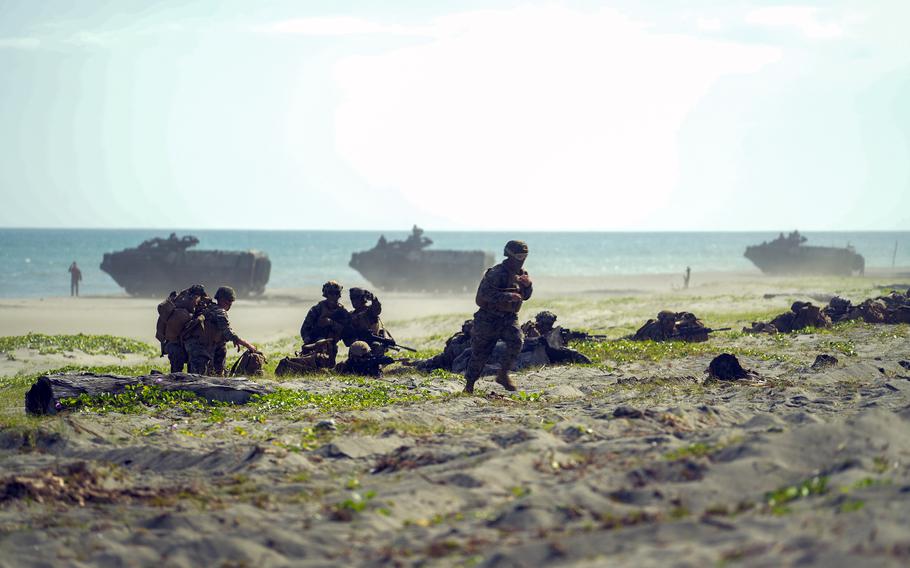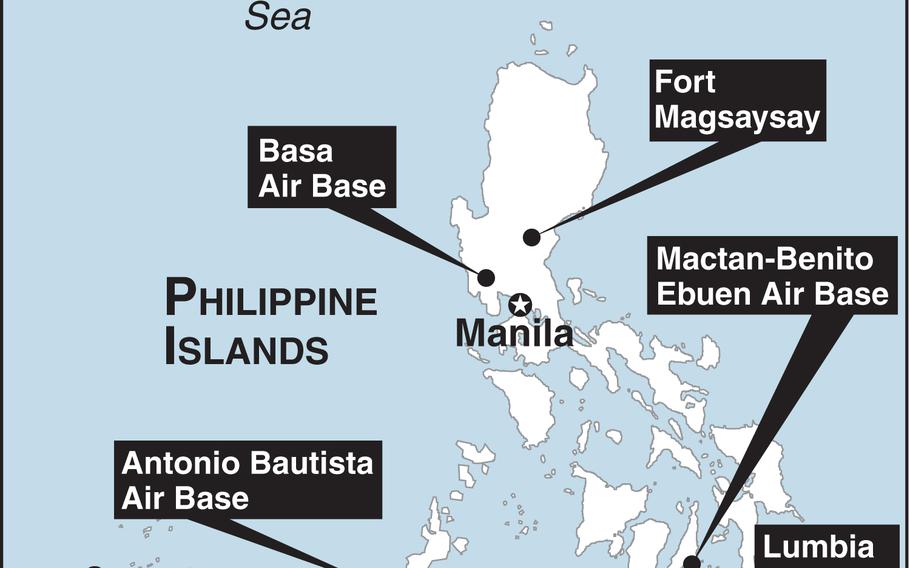
U.S. and Philippine marines and sailors conduct an amphibious landing during Balikatan training in the province of Cagayan, Philippines, March 31, 2022. (Madison Santamaria/U.S. Marine Corps)
(Tribune News Service) — It's been more than three decades since the Philippines ordered U.S. troops to withdraw from their sprawling military bases in the country, ending an era that hearkened back to America's colonial days.
Now the man overseeing the Subic Bay Metropolitan Authority — once home to the U.S.'s biggest naval base in Asia — wants them back.
A recently revived defense agreement between the U.S. and the Philippines could "be a welcome development for us" if American forces return to Subic Bay, said Rolen Paulino, the authority's chairman, in an interview. "When they come here they spend money, go to hotels, go to restaurants — plus tourists."
Paulino isn't alone. Beyond the local economic benefits, the Philippines' strategic location means that a renewed U.S. presence would be a huge asset to Washington in case of a conflict over Taiwan.
In contrast to earlier decades, when the U.S.-Philippine alliance was seen as skewed toward Washington, now Manila has security concerns of its own.
President Ferdinand Marcos Jr.'s government is looking to counter a record number of Chinese incursions in the disputed South China Sea that have seen Filipino fishing ships harassed or driven away from traditional waters. Public outcry erupted last month when a Chinese coast guard vessel aimed a laser at a Philippine ship.
Marcos was blunt in telling the armed forces this week that their mission has changed, and put U.S.-China tensions as the reason why.
"There was a time where we did not have to worry about these threats and the intensification of the competition between the superpowers," Marcos said Feb. 27. "Now things have begun to change and we must adjust accordingly."
So far, public sentiment appears to be on the side of stronger U.S. ties.
In a survey published Feb. 9 by the ASEAN Studies Centre at the ISEAS-Yusof Ishak Institute in Singapore, nearly 79% of Filipinos said if Southeast Asia were forced to choose between the U.S. and China, they would choose the former.
Marcos isn't just looking for U.S. support: he's turning to regional allies as well. He said he'd be open to a reciprocal military access agreement with Japan if it would protect the country's fishermen and its maritime territory, and last month the Philippines said it's considering joint patrols with Australia.
"The Philippines straddles a crucial location in the Pacific, and we have seaboards to the north, south, east and west," Defense Secretary Carlito Galvez Jr. said in a statement this week. "All of these must be monitored and protected."
But while U.S.-China tensions are driving the rapprochement, America's complicated past with the Philippines, and fears that embracing Washington will drag Manila into any future conflict with China, are giving some communities pause.
"They are not welcome," said Manuel Mamba, governor of Cagayan province, which hosts one of the facilities U.S. troops might soon have access to. "China has been good to us. I don't see any threat coming from them and my province is one of the nearest to them."

(Noga Ami-rav/Stars and Stripes)
That kind of pushback may be why U.S. Defense Secretary Lloyd Austin and Galvez stopped short of disclosing where U.S. troops would be working when they agreed last month to expand the Enhanced Defense Cooperation Agreement. That's a 2014 accord that was shelved under former President Rodrigo Duterte.
The EDCA deal allows the U.S. to rotate troops for prolonged stays as well as build and operate facilities at designated sites, most of which are expected to be in the country's north, closer to Taiwan, or along the South China Sea.
Austin hailed the agreement as a "really big deal," and it was seen as more evidence that Washington's long-promised pivot to Asia is finally underway.
But in a joint briefing with Austin, Galvez was careful to refer to the four unnamed locations US forces would go to under the agreement as "EDCA sites," not bases, and stressed that the deal was still contingent on consultations with local authorities. President Marcos later said Subic Bay isn't on the list of sites being considered, after a Philippine defense official said it was last year.
The EDCA expansion "is heavy on the hype, but wanting on the substance," said Rommel Ong, a retired rear admiral in the Philippine Navy who is now a professor at Ateneo de Manila University's School of Government.
Gov. Mamba says he believes hosting American troops would be a security risk for his province, located about 200 miles from Taiwan at the northern tip of Luzon island. He also fears it would torpedo a $7 billion Chinese infrastructure package he said could transform the otherwise sleepy province.
In other communities, stories about mistreatment by visiting US troops in the past still resonate. The killing of a transgender Filipino in Subic Bay in 2014 by a US Marine on leave from a visiting warship sparked outrage and a renewed clamor for a review of the Philippines' military commitments.
"Local opposition probably is a concern, certainly," said Carl Schuster, a former operations director at U.S. Pacific Command's Joint Intelligence Center. "The U.S. Navy was not very popular there."
And then there's the fear of getting pulled too deep into a U.S.-China conflict. That was behind the objections raised by President Marcos' sister, Sen. Imee Marcos. The senator, who chairs the foreign relations committee and is known for her political independence, grilled Defense Secretary Galvez at a hearing on Wednesday.
"We are not volunteering to fight wars that are not our own," the senator said. The president's office didn't immediately respond to a request for comment on the remarks.
Within Southeast Asia, not all leaders are comfortable with the US embrace. Malaysian Prime Minister Anwar Ibrahim says welcoming military forces is the wrong approach to deescalating tensions.
"It would be disconcerting if any force, East or West, starts showing military might or presence within Asean," Anwar said in an interview with ABS-CBN News Channel in the Philippines broadcast on Friday.
It's all evidence of how Marcos has to navigate the US-China relationship carefully. Like other regional leaders, he has an interest in maintaining ties with Beijing, his country's top trading partner. In January, Marcos visited President Xi Jinping, with the two sides agreeing to resume talks on joint oil and gas exploration in the South China Sea.
In the end, however, Marcos appears more open to the U.S. than many experts expected. The president's remarks ruling out Subic Bay from the list of places expected to welcome more US troops may be more symbolic than substantive. U.S. Navy ships still call there and American troops flow in for the annual Balikatan military exercises.
Paulino — the Subic Bay authority's director — said it's time to move on. The area he oversees could benefit from more investment. The now-private shipyards struggle to find commissions renovating yachts, and limited tourism appeal has forced the local airport — built in the shape of an aircraft carrier — to darken its halls.
Sitting in his offices overlooking the bay, Paulino said he told U.S. Ambassador MaryKay L. Carlson late last year that negative feelings about the American presence are in the past.
"I told her that there's no such thing here; no resentment, nothing whatsoever," he said.
©2023 Bloomberg L.P.
Visit bloomberg.com.
Distributed by Tribune Content Agency, LLC.